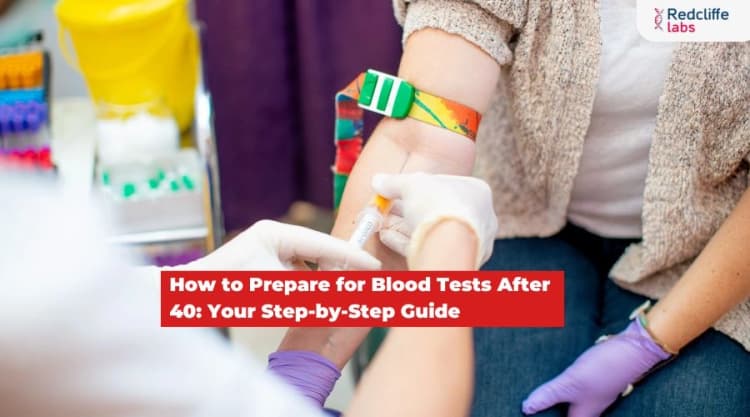Blood
Unlock special
discount on
this package
Login to Unlock 🔓
NABL Accredited lab*

Booking Benefits Unlocked Worth FREE 799

Report Consultation

Diet Plan
*Available once your report is generated.
At Redcliffe Labs, we have a single goal: to give India its right to quality diagnostics.
Customers served
Tests Processed Everyday
Cities
Collection Centres
World Class In-house Labs
Home Collection Experts
1 Test Parameters
Apolipoprotein B (Apo B)
1 PARAMETER INCLUDED
1 PARAMETER INCLUDED
- Apolipo-B
Top Booked Health Checkup Packages
Reports in 12 hours
|Parameters 94
Reports in 12 hours
|Parameters 96
Reports in 12 hours
|Parameters 89
Reports in 12 hours
|Parameters 96
Reports in 12 hours
|Parameters 90
Helps you know your test better
Q. What Is Apolipoprotein B?
Q. How Should You Prepare For Apolipoprotein B Test?
Q. What Is The Normal Range Of Apolipoprotein B?
Q. Where To Get ApoB B Test Done?
Verified by Medical Expert

WRITTEN BY
Sheena Mehta

MEDICALLY REVIEWED BY
Dr. Pradeep Lodha
Table of Content
Introduction to Apolipoprotein B Test
Apolipoprotein B attaches to negative types of cholesterol responsible for plaque buildup in your blood vessels, resulting in damage and heart disease. The apolipoprotein B test measures the amount of apolipoprotein B in your blood. Also known as the Apo B test provides an in-depth analysis of your heart health by evaluating your risk of developing cardiovascular disease (CVD), such as a heart attack or stroke. Your doctor may suggest the test if he finds you have a family history of heart disease and high cholesterol and triglyceride levels. The test also helps monitor treatment for high cholesterol or diagnose a rare inherited apoprotein B deficiency.
If your healthcare provider has suggested the test based on your symptoms, you need not worry. Book the Apolipoprotein B test from Healthy India Ki Trusted Lab, Redcliffe Labs. Ours is the best omnichannel pan-India diagnostic service provider, where you can get tested from home. Our phlebotomists are well-trained and highly professional, ensuring painless finger prick testing and accurate test reports within a stipulated time. So, why wait? No delay is good when it comes to your heart health. Get tested now!
Test Details:
| Also known as | Apolipoprotein B-100 test, apo B test, apo B blood test, and apoB test |
| Purpose | The apolipoprotein-B test measures LDL-C and non-HDL-C, indicating an enhanced risk of cardiovascular disorders. |
| Preparation | Do not drink or smoke before the test. |
| Fasting | No fasting is required. |
| Get reports within | 15 hours |
| Actual Price | INR 1500 |
| Cost | INR 410 |
What is Apolipoprotein B?
An apolipoprotein B test provides valuable insights into your heart health. The test helps evaluate the risk of developing cardiovascular disease (CVD), such as heart attack and stroke.
Apolipoprotein B, known as APO b, is a crucial protein connected with low-density lipoprotein (LDL), or bad cholesterol. The increased Apo-B levels are linked to the increased risk of atherosclerosis. It is a process of plaque buildup in the arteries that can contribute to heart attacks, strokes, and other cardiovascular diseases.
An apolipoprotein-B is useful when an LDL test may not provide a clear picture of cardiovascular risk. The doctor may advise the test when you experience symptoms of heart disease or cardiovascular problems.
Additionally, the apolipoprotein B test is also considered when you are already diagnosed with CVD . The expert wants to monitor if the treatment is showing positive results.
Nevertheless, consult your doctor for treatment plans and lifestyle adjustments, including dietary changes, weight loss, and medications.
What is the purpose of the Test?
The Apolipoprotein B-100 test, or Apo B, is a blood test to inform you about your risk of developing cardiovascular (heart and blood vessel) disease. The test is ordered as part of a lipid panel or cholesterol screening to present a complete picture of cardiovascular risk. ApoB is a protein responsible for transporting fat and cholesterol throughout the body. A healthy person has low levels of low-density lipoprotein (LDL). However, more significant levels can indicate an increased risk of heart disease.
A healthcare provider suggests the Apolipoprotein B Test to figure out the indicators for cardiovascular disease and type 2 diabetes. Besides, the test also measures VLDL, LDL, and HDL cholesterol, triglycerides, and glucose.
The doctor might order the test for different reasons, such as
- Family History of Heart Problems: Your healthcare provider may suggest the test to determine if you have a family history of heart disease at an early age.
- Previously diagnosed heart problems: A family history of heart problems alone may not confirm the need for the apolipoprotein B test. Hence, a provider may suggest the test for previously diagnosed heart problems.
- To monitor treatment: The Apo B test also helps track the effectiveness of treatment for individuals undergoing cholesterol-lowering therapy.
- High-risk individuals: The test is also recommended for evaluating cardiovascular risk more effectively in individuals with other risk factors like smoking, a sedentary lifestyle, diabetes, pregnancy, or smoking.
No matter the reason, if your doctor has suggested an Apo B blood test based on your symptoms, risk factors, or other reasons, getting tested in time is crucial to evaluating your heart health and initiating the treatment accordingly.
What does the test detect?
The Apolipoprotein B Test is a blood test that informs you about your risk of heart and blood vessel disease. Some healthcare providers consider an Apo B test more accurate than a lipid panel test to estimate cardiovascular disease risk. The apo B molecule carries one of the bad lipoproteins. Hence, with Apo B testing, you can get an accurate count because of the one-to-one ratio. The test is a better risk predictor for people with metabolic syndrome or diabetes because their LDL may be denser or smaller.
Why do I need this test?
You may need an Apolipoprotein B Test because:
- The test is done for you with risk factors, including high BP, poor heart attack or stroke, family history of heart disease, and/or high cholesterol or triglycerides, obesity, and diabetes.
- High levels of fats may also cause risk for heart conditions. You may need this test if you experience chest pain, shortness of breath, palpitations, or even heart attack.
- The test helps doctors with the best treatment strategy catering to your needs.
- The test also helps monitor the effectiveness of ongoing treatments related to heart disease.
- The test is also useful if you are taking lipid-lowering medications.
- Additionally, the ApoB testing is done for metabolic disorders or liver disease.
Who requires an Apolipoprotein test?
An Apo B, along with an apo A-I or other lipid tests is typically recommended to evaluate the risk for, or suspicion of having, cardiovascular or lipid-related disorders. Here is a breakdown of who may require this test:
- People with a family history of heart disease or stroke: People with genetic factors to cardiovascular diseases, especially, if someone close has experienced heart attacks or strokes at a young age.
- Individuals with dyslipidemia: People who are diagnosed with abnormal cholesterol or triglyceride levels
- Diagnosed CVD diseases: The test helps the severity of lipid-related risk factors. It also monitors the effectiveness of treatment.
- Patients suspected of having metabolic syndrome: The test helps those individuals who have obesity, high BP, high blood sugar, and abnormal cholesterol levels.
- People with diabetes: Diabetes can increase the risk of CVD diseases. The ApoB test is done to evaluate the abnormalities of lipids in sugar patients.
- Individuals on cholesterol-lowering therapy: The test also monitors the efficacy of medications.
- High-risk smokers: Smoking is not good. It can increase the risk of developing atherosclerosis and heart disease in them.
What other tests might you need along with this test?
The other test you might need along with the apolipoprotein b test include a total cholesterol or a lipid profile test:
Lipid Profile Test: It measures high-density lipoprotein (HDL or good cholesterol), LDL cholesterol (bad cholesterol), and triglycerides.
Note: Discuss your doubts with your healthcare provider before the test to receive more accurate reports.
Preparation for the Test
The apolipoprotein B test involves a blood drawing procedure and does not require specific preparations. However, for accurate results, there are a few general guidelines that one should follow.
- The test doesn’t require fasting; however, your doctor may advise you to refrain from eating or drinking (except water) for several hours (typically 8 + hours) before the test.
- If you are on some medications, whether prescribed or non-prescribed, you should consult your physician before the test. Certain ingredients in the test can influence your test results. Only stop or take medicines with their guidance.
- No strenuous exercise to avoid hormone fluctuations and ensure accurate results.
Nevertheless, if you have any doubts or concerns about the test preparations, kindly discuss them with your doctor to ensure the measurements are appropriately taken and the test results are accurate.
What is the procedure for the Apolipoprotein B Test?
The apolipoprotein B test procedure is simple. The test is done with a blood sample. If you have booked the APO B test from Redcliffe Labs, our phlebotomist will come to your doorstep with a home sample collection kit. The steps in a test procedure include:
- Firstly, during an Apo B test, the phlebo will ask you to rest your arm on the chair.
- He will tie a stretchy band tightly around your upper arm. It will slow blood flow, and the vein will puff up.
- Then, he will clean the area where he will insert a needle into the vein to draw the blood.
- Once the blood is drawn, the placebo will remove the syringe, and a bandage will be applied to the site to prevent excessive bleeding or minimize the chances of infection.
- Lastly, he will transfer the collected blood to the vial and send it to the laboratory for analysis.
What do the apolipoprotein B test reports indicate?
The Apo B test helps your doctor analyze whether or not you are at a higher risk for cardiovascular disease. Normal apolipoprotein B test levels are usually below 100 mg/dL in an approximate reference range. If your apolipoprotein B levels are higher than 100 mg/dL, you are at a higher risk of heart and blood vessel disease. However, normal reference ranges vary between laboratories and the processes used. Besides, age, gender, and health history can affect the normal ranges of apo B levels.
What if your apolipoprotein B test is positive?
If your Apo B test report is positive, it means you have higher apolipoprotein B levels than normal, and you are at a greater risk for heart disease. Certain underlying conditions can cause high apo B levels, including:
- Underactive thyroid
- Kidney Disease
- Diabetes
- Pregnancy
- Use of drugs such as androgens, diuretics, beta-blockers, and progestins.
Talk to your doctor about understanding what your specific results mean.
Who should take the Apo B test?
The apo B test is usually ordered as part of a lipid test. The test helps doctors when traditional cholesterol tests, such as LDL cholesterol levels, are discordant to provide a complete picture of cardiovascular risk.
- The Apo B test is also prescribed to a person who has a history of high cholesterol and triglyceride levels and a family history of cardiovascular disease to assess the risk.
- The ApoB blood test might be recommended for individuals with other risk factors such as sedentary lifestyle, smoking, obesity, smoking, or diabetes.
- The ApoB test is also helpful to monitor the effectiveness of lipid treatment as an alternative to non-HDL-C.
- If a doctor suspects someone has inherited apoB deficiency, they might suggest taking the test.
What are the risk factors associated with the Apolipoprotein B test?
The Apo B test is simple and does not involve a major risk. However, some people might feel dizzy or lightheaded after drawing blood.
Besides, you may also develop a bruise on the punctured area for a few days, but the pain and symptoms will disappear.
If symptoms continue for over two days, you should seek medical assistance.
What are the risk factors for the Apo B test?
The raised or elevated levels of apoB correspond to the elevated levels of LDL-C and non-HDL-C. These elevations may be due to consuming a high-fat diet or decreased clearance of LDL from the blood. All these conditions are associated with an increased risk of cardiovascular disease. Besides, the ApoB tests are higher in males than females and tend to increase with age.
Can anything affect ApoB100 test results?
Yes. Lifestyle factors and medications might affect APO b 100 test results such as:
- Beta blockers
- Statins
- Vitamin B3
- Hormone drugs like androgens, estrogens, and progestins
- Surgery
- Weight loss
- High-fat diet
- Diuretics
- Thyroid medicines
What does the test measure?
An apolipoprotein B test measures the specific apolipoproteins in the blood. These proteins transport lipids (fats and cholesterol) in the blood.
APO b is a major component of certain lipoproteins, which are responsible for transporting lipids.
Additionally, apolipoprotein B (ApoB) is present in very low-density lipoproteins (VLDL), low-density lipoproteins (LDL), and intermediate-density lipoproteins (IDL). These are atherogenic lipoproteins that promote plaque buildup in the arteries.
Book the Apolipoprotein B Test at an Affordable Apolipoprotein B Price at Redcliffe Labs!
If your doctor has suggested an apolipoprotein B test, you need not delay—book now with Redcliffe Labs. Take appropriate preventive action to preserve your heart health. You can get tested with us at a highly affordable price of INR 410. You can avail of our doorstep home sample collection. Express slots are also available to pick up your sample within 45 minutes and accurate reports within a given time frame. So, what are you waiting for? Book the apolipoprotein B test now!

Apolipoprotein B Test Price in Different Cities - Redcliffe Labs
| City Name | Discounted Price |
| Delhi | ₹410 |
| Ahmedabad | ₹410 |
| Mumbai | ₹410 |
| Bangalore | ₹410 |
| Noida | ₹410 |
| Pune | ₹410 |
| Lucknow | ₹410 |
| Hyderabad | ₹410 |
| Chennai | ₹410 |
| Gurgaon | ₹410 |
| Jaipur | ₹410 |
| Faridabad | ₹410 |
| Indore | ₹410 |
| Patna | ₹410 |
Note: We also offer Apolipoprotein B Test PAN India. Please call the number 8988988787 to check the availability of our services in your area.
Conclusion:
The apolipoprotein B test is easy and helps you know your heart attack or stroke risk. The high levels of ApoB indicate an increased number of atherogenic particles, resulting in a higher risk of plaque formation in the arteries. Your healthcare provider may order an Apo B test, as he needs more information about your risk than a lipid panel test can provide to provide a comprehensive view of lipid-related cardiovascular risk. Nevertheless, with regular monitoring and an appropriate lifestyle based on your ApoB levels, you can significantly contribute to better cardiovascular outcomes.
5 Simple Steps to Manage Your Health with Redcliffe Labs
Quick, Simple & Convenient; trusted care delivered to your doorstep.

Start Your Online Booking
Open the Redcliffe Labs website/app. Select the test or package and enter your details. Schedule the service for your preferred slot.

Live Tracking
Stay updated with real-time tracking for a smooth and timely home sample collection.

Sample Collection
Our certified experts ensure a smooth, hygienic, and fully compliant sample collection experience.

Doctor-Verified Smart Reports
Every report is clinically checked by expert doctors and shared with smart, actionable insights.

Your Health Journey Continues Post Reports
Consult with our expert medical team to get actionable insights to improve your health.
Nearby Labs(9)
Redcliffe Labs Noida

MC-5280
Redcliffe Collection Center
Redcliffe Collection Center
Redcliffe Collection Center
Redcliffe Collection Center
Redcliffe Collection Center
Redcliffe Collection Center
Redcliffe Collection Center
Redcliffe Collection Center
Frequently Asked Questions
What is an apolipoprotein B test?
What is the price of apolipoprotein B test?
What does the apolipoprotein B test for?
How is the apolipoprotein B test done?
How can I increase my apolipoprotein B?
What if apolipoprotein B is high?
What if apolipoprotein B is low?
Does exercise lower ApoB?
Can I book a Apolipoprotein B Test near me?
Can I book a home collection for a Apolipoprotein B Test?
Health Articles & Blogs
My Health
Stay informed with our expert health articles and blogs. Explore comprehensive guides on diseases, nutrition, preventive care, and wellness tips to help you make better health decisions.
How to Prepare for Blood Tests After 40: Your Step-by-Step Guide

Why is PCOS Continuously Rising in Women?

10 Healthy Holi Recipes for Your Fitness Goals in 2026
Looking for healthy Holi recipes? Discover 10 festive dishes that support your fitness goals while keeping celebrations delicious.

Importance of Heart Health Before Pregnancy: Everything You Need to Know

Migraine Treatment at Home: Effective Ways to Relieve Migraines Naturally

High SGPT and SGOT Levels: Causes, Symptoms, Normal Range & When to Worry

Brain Hemorrhage Symptoms: Early Warning Signs, Types, Causes & When to Seek Emergency Care

What is SGPT in Blood Reports? Everything You Need to Know
Explore My Health
